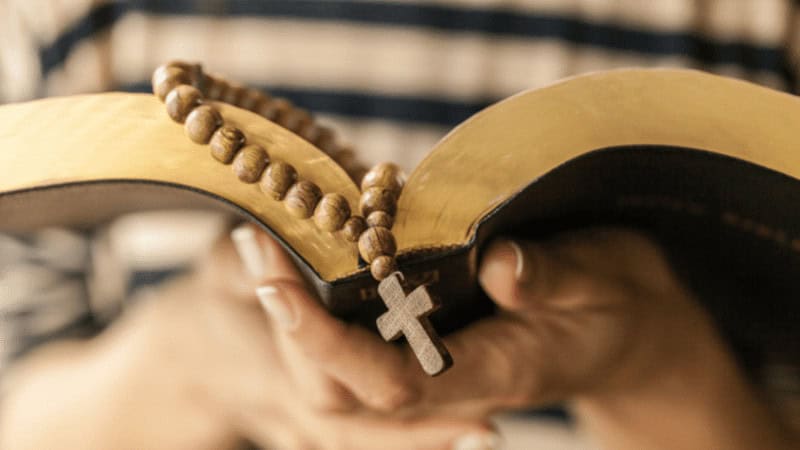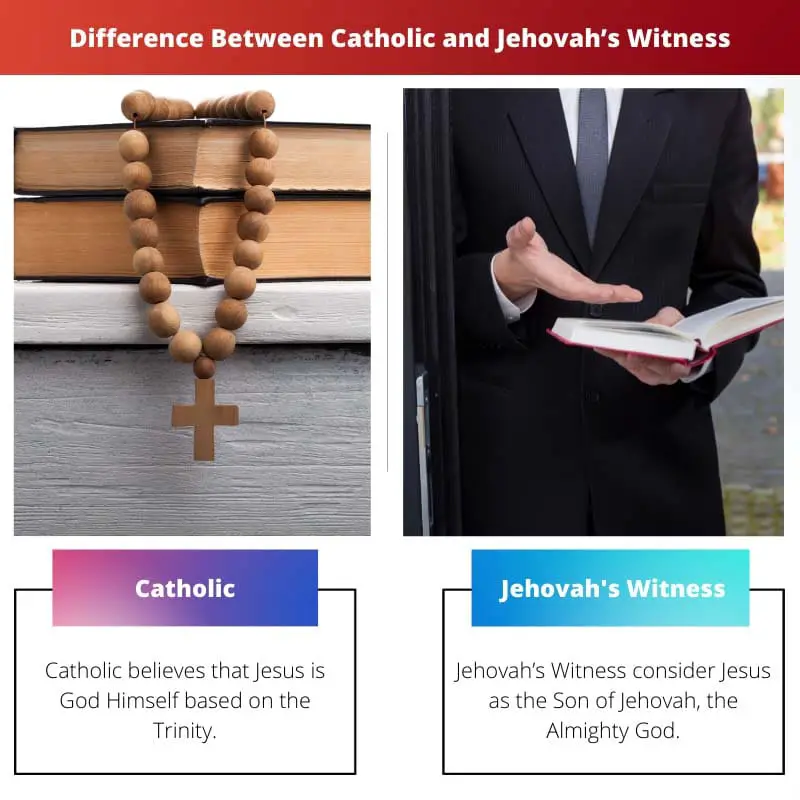Christianity mainly has two religious organisations- Catholic and Jehovah’s Witness. Both of these religious organizations are based on one common source- Bible.
But the teaching of these two religious organizations of Christianity is different from each other. There are very few in common between these religious organizations.
Key Takeaways
- Catholics believe in the Holy Trinity, while Jehovah’s Witnesses view God (Jehovah) as a singular entity.
- Catholics have a hierarchical clergy structure, while Jehovah’s Witnesses have a more decentralized congregation-based organization.
- Jehovah’s Witnesses reject traditional Christian holidays and customs, whereas Catholics embrace and celebrate them.
Catholic vs Jehovah’s Witness
Catholics believe in the Holy Trinity, the divinity of Jesus Christ, the Virgin Mary’s immaculate conception, and the sacraments. Jehovah’s Witnesses reject these beliefs and instead view God as a singular entity, deny the divinity of Jesus, and do not recognize the Virgin Mary as an intercessor.

Catholic is part of Christianity that believes in One God, the maker of earth, heaven, and all the invisible and visible components, the Almighty.
The main teachings of Catholics are the objective existence of God, the interest of God in the person, who can easily enter into relations with God, Jesus’s divinity, and the immortality of the soul of each individual.
Jehovah’s Witness is different from mainstream Christianity. It is a religious group that is a restorationist Christian denomination with the beliefs of nontrinitarian.
Jehovah’s Witnesses are governed by the Jehovah’s Witnesses’ Governing Body, which establishes all doctrines based on its Bible interpretations.
They believe that the establishment of God’s kingdom on earth is the only solution to every issue faced by human beings.
Comparison Table
| Parameters of Comparison | Catholic | Jehovah’s Witness |
|---|---|---|
| Identity of Jesus | Catholic believes that Jesus is God Himself based on the Trinity. | Jehovah’s Witness consider Jesus as the Son of Jehovah, the Almighty God. |
| Afterlife | Catholic believes in temporal purgatory, eternal hell, and heaven. They believe that good people go to heaven with the acceptance of St. Peter and evil people go to hell and are punished forever. | Jehovah’s Witness believe that a dead person can not feel, experience, or see anything until the Judgement Day of Jehovah. After Judgement Day all the dead people will rise from their graves and enjoy their life with their loved ones. |
| Idol worship | Catholic preaches religious symbols and idols. | Jehovah’s Witness do not believe in praising religious symbols and idols. |
| Baptism | Catholic baptize their new members from their infantry. | Jehovah’s Witness baptize their new members when they are well aware of their basic teaching them. |
| Leaders | Catholic ministers need to be highly educated with proper understandings of the history, beliefs, and practices of Catholicism. | All Jehovah’s Witness is considered to be the ministers. |
What is Catholic?
Catholicism is one of the main religious organizations of Christianity. They believe in One God, the maker of earth, heaven, and all the invisible and visible components, the Almighty.
Catholic believe that God is not a part of nature, but God is the creator of nature. Catholics believe that Jesus is the God Himself based on Trinity, the Son and Father, and Holy Ghost.
The main teachings of Catholics are the objective existence of God, the interest of God in person, who can easily enter into relations with God, Jesus’s divinity, and the immortality of the soul of each individual. Catholics believe in temporal purgatory, eternal hell, and heaven.
They believe that good people go to heaven with the acceptance of St. Peter and evil people go to hell and are punished forever.
Catholic preaches religious symbols and idols. Catholic baptize their new members from their infantry.
To baptize the baby, a priest will pour the head of the baby with holy water in a formal religious ceremony.
Catholic ministers need to be highly educated with a proper understanding of Catholicism’s history, beliefs, and practices. Catholic ministers can’t marry.
Catholic beliefs adhere to one apostolic, holy, and catholic church. Catholics consider Bible as the word of God. Catholic Bible has 73 book canon, which the Catholic Church recognizes.

What is Jehovah’s Witness?
Jehovah’s Witness is a religious organization of Christianity that believes the establishment of God’s kingdom on the earth is the only solution to every issue faced by human beings.
Jehovah’s Witness considers Jesus as the Son of Jehovah, the Almighty God.
Jehovah’s Witness is different from mainstream Christianity. It is a religious group that is a restorationist Christian denomination with the beliefs of nontrinitarian.
Jehovah’s Witnesses are governed by the Jehovah’s Witnesses’ Governing Body, which establishes all doctrines based on its Bible interpretations.
Jehovah’s Witness believe that a dead person can’t feel, experience, or see anything until the Judgement Day of Jehovah.
After Judgement Day, all the dead people will rise from their graves and enjoy their life with their loved ones.
Jehovah’s Witnesses do not believe in praising religious symbols and idols. Jehovah‚ Äôs Witness baptize their new members when they are well aware of their basic teaching them.
Baptism is conducted during conventions and assemblies where the whole body is immersed in the holy water.
All Jehovah’s Witness is considered to be the ministers. All the ministers are allowed to get married. Jehovah’s Witness focuses on the 66 original books of the Bible that emphasize the name of God.
Their official Bible is the new translation of the Holy Scriptures that highlights the need to identify the name of God.
Main Differences Between Catholic and Jehovah’s Witness
- Catholics believe that Jesus is the God Himself based on Trinity. On the other hand, Jehovah’s Witness considers Jesus as the Son of Jehovah, the Almighty God.
- Catholics believe in temporal purgatory, eternal hell, and heaven. They believe that good people go to heaven with the acceptance of St. Peter and evil people go to hell and are punished forever. In contrast, Jehovah’s Witness believe that a dead person can not feel, experience, or see anything until the Judgement Day of Jehovah. After Judgement Day, all the dead people will rise from their graves and enjoy their life with their loved ones.
- Catholic preach religious symbols and idols. On the contrary, Jehovah’s Witness does not believe in praising religious symbols and idols.
- Catholic baptize their new members from their infantry. Jehovah’s Witness baptizes their new members when they are well aware of their basic teaching.
- Catholic ministers need to be highly educated with a proper understanding of Catholicism’s history, beliefs, and practices. On the other hand, all Jehovah’s Witnesses are considered to be ministers.

- https://books.google.co.in/books?hl=en&lr=&id=fpVOVDCoi6MC&oi=fnd&pg=PR9&dq=catholic&ots=epQ9OQuuLJ&sig=VO4g90QV3Mcy71rXw1PMGlYhG8E&redir_esc=y
- https://www.scielo.br/j/rba/a/m6YkpxJZ6rgpHxWRJHHzxbf/abstract/?lang=en

The comprehensive breakdown of the disparities between Catholicism and Jehovah’s Witness serves as an informative resource for understanding the fundamental differences between these two religious organizations.
The differences between Catholicism and Jehovah’s Witness are well-explained in this article, providing a clear and concise overview of their contrasting beliefs. I particularly appreciate the thorough analysis.
The article accurately provides comparative insights into the beliefs of Catholicism and Jehovah’s Witness, which is incredibly valuable for those seeking to understand the differences between these two religious organizations.
This article provides a comprehensive analysis of the differences between Catholicism and Jehovah’s Witness that sheds light on their key teachings and beliefs. The comparison table is particularly helpful.
The article presents an in-depth examination of the disparities between Catholicism and Jehovah’s Witness, contributing valuable insights into the core discrepancies in their ideologies.
The distinct characteristics of Catholicism and Jehovah’s Witness are demarcated with precision in this article, offering a pragmatic view of their respective teachings and practices.